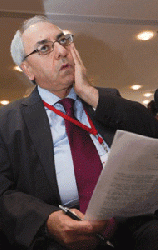ANKARA – The United States is backing away from the Syrian National Council and reaching out to opposition groups inside Syria in hastened attempts to foster a democratic political transition in the event of President Bashar Assad’s fall.

|
| Mohammad Sarmini, a Muslim Brotherhood-aligned SNC spokesman, said attempts were made to meet with Clinton to discuss ways to assist the Syrian opposition, but the U.S. refused. |
In a revealing move, U.S. Secretary of State Hillary Clinton snubbed the exiled umbrella opposition group during talks in Istanbul Saturday at a meeting with Turkish Foreign Minister Ahmad Davutoglu.
Clinton and Davutoglu announced after the meetings that the United States and Turkey are considering the possibility of a ‘no-fly’ zone in Syria – the clearest sign yet that the U.S. is open to some kind of military intervention in the conflict.
Clinton also met with a number of Syrian opposition, civil society and youth leadership figures, according to a State Department official, but declined to meet the SNC, prompting consternation from at least one senior SNC figure who complained the group was being “sidelined.”
Mohammad Sarmini, a Muslim Brotherhood-aligned SNC spokesman, said attempts were made to meet with Clinton to discuss ways to assist the Syrian opposition, but the U.S. refused.
“I don’t know what the U.S. is doing, but they have a big problem,” he complained.
“They pledged millions, but we haven’t seen any of it,” he said in reference to a $25-million package to give rebels non-lethal and communications equipment, announced at the Friends of Syria conference in Istanbul in April.
A State Department official confirmed Clinton had declined to meet with SNC members, but said she plans to at the next Friends of the Syrian People ministerial meeting.
“Clinton wanted to engage with another facet of the Syrian revolution – activists and civil society leaders,” the official said.
“She spoke to them about what we can do to further strengthen their work to ensure that when the day comes that the Assad regime is gone, there is a strong, vibrant civil society that is working with those who take leadership positions to protect human rights of all citizens,” the official said.
The SNC, according to analysts and diplomats, has frustrated international leaders in its failure to overcome paralyzing divisions and unite opposition fighters under one umbrella.
Pointing to what he said was a “real concern” in Washington over the increase in Islamic extremism among fighting elements, efforts were being focused on networking with secular, liberalist opposition groups inside the country – so far, the U.S. has come up empty-handed, Azm said.
One youth activist, Jawad al-Khateeb, who met with Clinton in Istanbul, said talks centered on how to reach civil society organizations.
The State Department official said Washington is working hard with international partners to help Syrians in a transition, but stressed that the process must be Syrian-led.
Asked what was being done to counter extremism, the official said it was not clear “the extent to which extremists are working with opposition elements.
“The overwhelming majority of the opposition is composed of ordinary Syrians who are tired of this dictatorship … The Assad regime has created an environment that extremists are working hard to exploit for their own benefit.”
But, the official said, “the goals of the Syrian people and extremists have no overlap whatsoever.”
Andrew Tabler, senior fellow at the Washington Institute for Near East Policy said the snub was significant.
But the shift in U.S. focus to groups inside the country did not necessarily signal a change in policy from Washington. “I think they are very worried (about rising extremism) … but are they worried enough to intervene?”






Leave a Reply